Related Research Articles

As part of the foreign relations of Suriname, the country is a participant in numerous international organizations.

The Free Trade Area of the Americas (FTAA) was a proposed agreement to eliminate or reduce the trade barriers among all countries in the Americas, excluding Cuba. Negotiations to establish the FTAA ended in failure, however, with all parties unable to reach an agreement by the 2005 deadline they had set for themselves.
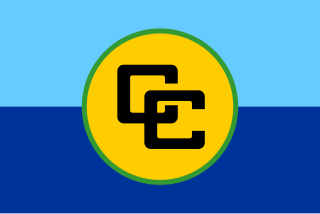
The Caribbean Community is an intergovernmental organisation that is a political and economic union of 15 member states and five associated members throughout the Americas and Atlantic Ocean. It has the primary objective to promote economic integration and cooperation among its members, ensure that the benefits of integration are equitably shared, and coordinate foreign policy. The organisation was established in 1973, by its four founding members signing the Treaty of Chaguaramas. Its primary activities involve:

The Caribbean Basin Trade Partnership Act (CBTPA) is a United States legislative act signed into law on May 18, 2000 by President Bill Clinton as part of the Trade and Development Act of 2000. This latter act, which also included the Africa Growth and Opportunity Act of 2000 (AGOA), was intended to advance U.S. economic and security interests by strengthening American relationships with other regions of the world then viewed to be making significant strides in terms of economic development and political reform.

The Regional Security System (RSS) is an international agreement for the defence and security of the eastern Caribbean region with future expansion planned with South America.

The Caribbean Free Trade Association (CARIFTA) was an English-speaking economic trade organisation. It organised on 1 May 1968, to provide a continued economic linkage between the English-speaking countries of the Caribbean. The agreements establishing it came following the dissolution of the West Indies Federation, which lasted from 1958 to 1962.
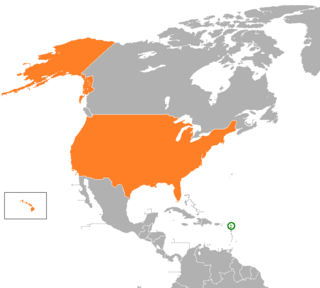
Relations between Antigua and Barbuda and the United States have been friendly since Antigua and Barbuda's independence from the United Kingdom in 1981.
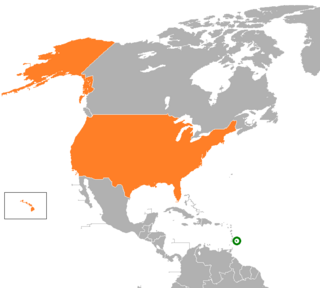
The United States and Barbados have had cordial bilateral relations since Barbados' independence in 1966. The United States has supported the government's efforts to expand the country's economic base and to provide a higher standard of living for its citizens. Barbados is a beneficiary of the U.S. Caribbean Basin Initiative. U.S. assistance is channeled primarily through multilateral agencies such as the Inter-American Development Bank and the World Bank, as well as the U.S. Agency for International Development (USAID) office in Bridgetown.

Dominica–United States relations are bilateral relations between the Commonwealth of Dominica and the United States of America.

Grenada – United States relations are bilateral relations between Grenada and the United States. The United States recognized Grenada on 7 February 1974, the same day as Grenada got independence from the United Kingdom of Great Britain and Northern Ireland. These nations formally established diplomatic relations on 29 November 1974.

Saint Kitts and Nevis – United States relations are bilateral relations between Saint Kitts and Nevis and the United States.
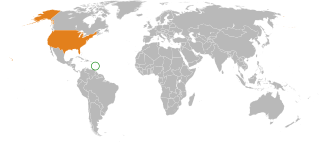
Saint Lucia – United States relations are bilateral relations between Saint Lucia and the United States. Roger F. Nyhus is the U.S. Ambassador to St. Lucia.

Saint Vincent and the Grenadines – United States relations are bilateral relations between Saint Vincent and the Grenadines and the United States.
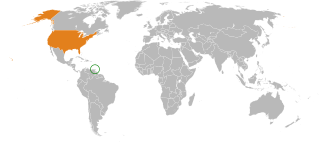
Trinidad and Tobago – United States relations are bilateral relations between Trinidad and Tobago and the United States.

This article deals with the diplomatic affairs, foreign policy and international relations of Barbados.

Antigua and Barbuda maintains diplomatic relations with the United States, Canada, the United Kingdom, and the People's Republic of China, as well as with many Latin American countries and neighbouring Eastern Caribbean states. It is a member of the United Nations, the Commonwealth of Nations, the Organization of American States, the Organisation of Eastern Caribbean States, the Bolivarian Alliance for the Americas, Petrocaribe and the Eastern Caribbean's Regional Security System (RSS).
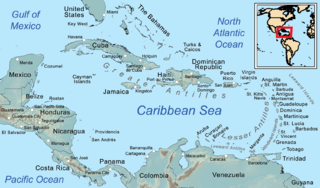
The Caribbean is a subregion of the Americas that includes the Caribbean Sea and its islands, some of which are surrounded by the Caribbean Sea and some of which border both the Caribbean Sea and the North Atlantic Ocean; the nearby coastal areas on the mainland are sometimes also included in the region. The region is south-east of the Gulf of Mexico and Northern America, east of Central America, and north of South America.

The Partnership for Prosperity and Security in the Caribbean (PPS) is a regional-level dialogue with the stated purpose of providing greater cooperation on security and economic issues. The Partnership was founded in Bridgetown, Barbados on March 10, 1997 by the Governments of the United States of America, Antigua and Barbuda, the Commonwealth of The Bahamas, Barbados, Belize, the Commonwealth of Dominica, the Dominican Republic, Grenada, the Co-operative Republic of Guyana, the Republic of Haiti, Jamaica, the Federation of St. Kitts and Nevis, Saint Lucia, St. Vincent and the Grenadines, the Republic of Suriname and the Republic of Trinidad and Tobago.

A member state of the Caribbean Community is a state that has been specified as a member state within the Treaty of Chaguaramas or any other Caribbean state that is in the opinion of the Conference, able and willing to exercise the rights and assume the obligations of membership in accordance with article 29 of the Treaty of Chaguaramas. Member states are designated as either More economically developed country (MDCs) or Less economically developed countries (LDCs). These designations are not intended to create disparity among member states. The Community was established by mainly English-speaking Caribbean countries, but has since become a multilingual organisation in practice with the addition of Dutch-speaking Suriname in 1995 and French-speaking Haiti in 2002. There are fifteen full members of the Caribbean Community, four of which are founding members.
References
- ↑ Clinton, Caribbean Leaders Sign Prosperity Agreement, May 10, 1997, CNN
- ↑ U.S. State Department (March 4, 1996). "TRINIDAD AND TOBAGO - SIGNING OF EXTRADITION AND MUTUAL LEGAL ASSISTANCE TREATIES - MARITIME COUNTER-DRUG COOPERATION AGREEMENT". Archived from the original on 2001-06-28.